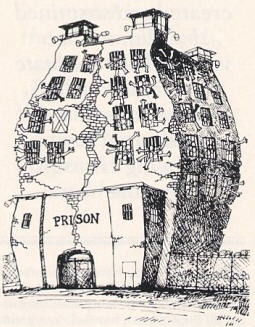Commenting on the prevalence of crime-related stories in the media, Boston Globe editor Thomas Winship recently wrote that violent crime in America has become "such an overpowering, tragic fact of life today that I'm not sure the media can overplay it."

In a 1981 New York Times public opinion poll, New Yorkers cited crime as the most serious problem facing their city more serious than inflation, unemployment, housing, transportation, taxes, schools, and the environmentcombined. Figures from the U.S. Department of Justice show violent crime in the U.S. increased sixty percent in the seventies. And the eighties are offering no hope of respite.
Concerned critics often propose tighter security and stiffer sentences, along with greater job opportunities for the young and the disadvantaged. But while such reforms would certainly help, a genuine solution must reach deeper. Ultimately, if we are to effect a lasting change, we must repair or even reconstruct the moral and spiritual foundation of our society. As Harvard professor James Wilson, a national authority on crime, pointed out in his article "Thinking about Crime," "If we hope to find in some combination of swift and certain penalties and abundant economic opportunities a substitute for discordant homes, secularized churches, intimidated schools, and an ethos of individual self-expression, we are not likely to succeed."
His Divine Grace A.C. Bhaktivedanta Swami Prabhupada, founder-acaryaof the International Society for Krishna Consciousness, explained that only a spiritual remedy can cure the modern epidemic of crime and violence. Society must learn the techniques for bringing forth the natural goodness within the hearts of all its citizens.
In July 1975, in a conversation with Lieutenant David Mozee of the Chicago police department, Srila Prabhupada said, "The difference between the pious man and the criminal is that one is pure in heart and the other is dirty. This dirt is like a disease in the form of uncontrollable lust and greed in the heart of the criminal. Today people in general are in this diseased condition, and thus crime is very widespread. When people become purified of these dirty things, crime will disappear. . . .
"The only way to permanently change the criminal habit is to change the heart of the criminal. As you well know, many thieves are arrested numerous times and put into jail. Although they know that if they commit theft they will go to jail, still they are forced to steal because of their unclean hearts. Therefore without cleansing the heart of the criminal, you cannot stop crime simply by more stringent law enforcement. The thief and the murderer already know the law, yet they still commit violent crimes due to their unclean hearts. So our process is to cleanse the heart."
In a spiritually centered society, citizens are taught from childhood how to purify their consciousness and thus attain freedom from the disturbing influences of lust and greed. And such a society recognizes this purification as the central aim of human life. By contrast, the chief goal of today's materialistic societies is economic development, and thus everyone learns to act selfishly for sense gratification. This prevailing mood agitates lust, anger, and greed, and then society must suffer the crime that springs from these negative emotions. A materialistic society, by attempting to exploit nature's resources for sense enjoyment, also generates excessive competition among its citizens. This inevitably leads to social inequality and corruption which further inflame the anger and frustrations of many potential or practicing criminals.
Although citizens of both a materially oriented and a spiritually oriented society seek pleasure, those in a spiritual culture enjoy the gradual realization of their eternal, blissful, spiritual consciousness and of their sublime relationship with God. The members of a materialistic society, however, aiming no higher than the fulfillment of bodily and mental demands, neglect self-realization and therefore feel profound discontent.
A materialistic society stifles its citizens' spirituality and virtue by exaggerating their bodily propensities for eating, sleeping, mating, and defending propensities we share with the animals. Thus people do all kinds of atrocious things in the name of sense gratification and the fulfillment of these basic needs.
A genuine religious process purifies the heart, mind, and senses of one who follows it, gradually raising him to the level of God consciousness. Any religious system unable to do so is impotent; it has no more value than a boat that cannot float. By giving us a direct experience of the supreme pleasure potency within the soul the science of Krsna consciousness effectively liberates the mind from lust, anger, greed, and the false, bodily conception of life. As explained in the great spiritual classic Srimad-Bhagavatam (1.2.19-20), "By practicing bhakti-yoga [devotional service to Krsna] one becomes freed from the modes of passion and ignorance, and thus lust and avarice are diminished. When these impurities are wiped away, one remains steady in his position of pure goodness and becomes joyful."
Only when our leaders will embrace universal religious principles, such as those of the Krsna consciousness movement, will violent crime decrease. Otherwise, spiritual deterioration will go on unchecked and more and more people will be compelled by uncontrollable lust, anger, and greed to prey on their fellow citizens.
